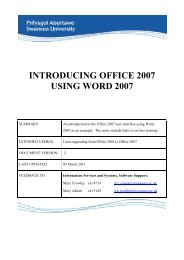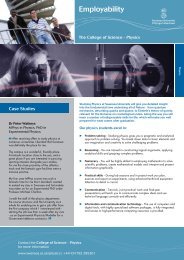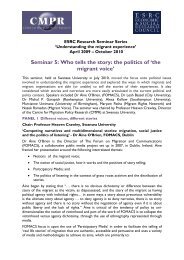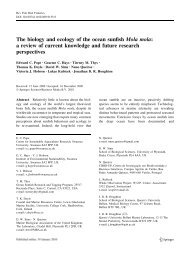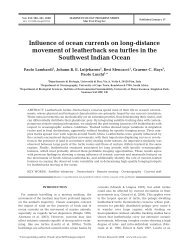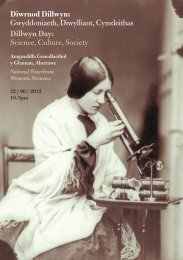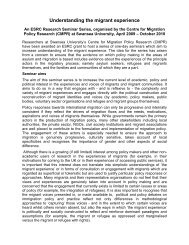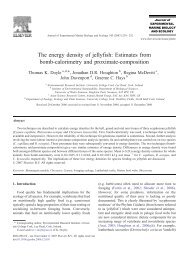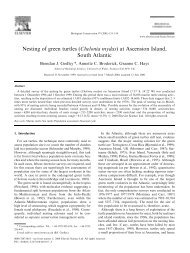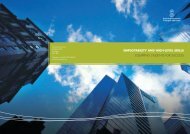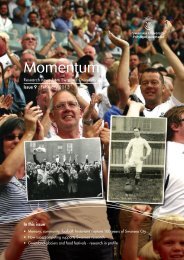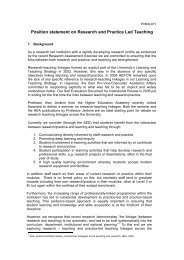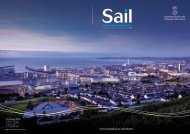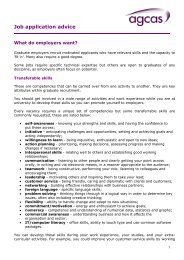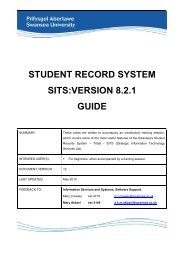Create successful ePaper yourself
Turn your PDF publications into a flip-book with our unique Google optimized e-Paper software.
The Alumni Office<br />
Singleton Abbey<br />
<strong>Swansea</strong> <strong>University</strong><br />
Singleton Park<br />
<strong>Swansea</strong> SA2 8PP<br />
Designed by iconcreativedesign.com<br />
sail<br />
<strong>Swansea</strong> <strong>University</strong>’s Alumni<br />
Magazine 2011<br />
www.swansea.ac.uk/alumni<br />
www.swansea.ac.uk/alumni
WELCOME TO SAIL,<br />
YOUR ALUMNI MAGAZINE<br />
03 04<br />
It’s that time of year again when we update you on the many exciting<br />
developments taking place at <strong>Swansea</strong> <strong>University</strong>, and give you some<br />
highlights of what your fellow alumni are doing now.<br />
Firstly, congratulations to our 2011 graduates, and best wishes to you<br />
all as you embark on the next stage of your academic or professional<br />
journey. As Alumni of <strong>Swansea</strong> <strong>University</strong> you are part of a growing<br />
global network; we hope you stay in touch and send news of where your<br />
course takes you in the coming years.<br />
09<br />
There are challenging times ahead for higher education institutions across<br />
the UK, but you can be confident that <strong>Swansea</strong> <strong>University</strong> is pushing<br />
full steam ahead with its commitment to providing an outstanding<br />
student experience, widening access to higher education, delivering<br />
career-enhancing programmes of study, implementing campus<br />
developments, and maintaining its position as a world-class,<br />
research-led institution.<br />
06<br />
We hope you enjoy this new edition of <strong>Sail</strong>. Your feedback and<br />
suggestions for future issues are welcome, and don’t forget to inform<br />
us of any change of address so we can keep you up-to-date with all the<br />
latest news from <strong>Swansea</strong>. For further information you can also visit our<br />
Alumni Association web pages.<br />
Best wishes from <strong>Swansea</strong>!<br />
Sally Thurlow,<br />
Alumni Officer<br />
11<br />
12<br />
<strong>Swansea</strong>’s Tuition Fee plan:<br />
putting students first<br />
Croeso i <strong>Sail</strong>, eich<br />
cylchgrawn cyn-fyfyriwr<br />
Adeg honno’r flwyddyn yw hi unwaith eto lle yr ydym yn rhoi’r<br />
wybodaeth ddiweddaraf i chi am y sawl datblygiad cyffrous sy’n<br />
digwydd ym Mhrifysgol Abertawe, ac yn rhoi’r uchafbwyntiau i chi o<br />
ran beth mae eich cyd gyn-fyfyrwyr yn ei wneud ar hyn o bryd.<br />
Yn gyntaf oll, llongyfarchiadau i raddedigion 2011, a dymuniadau<br />
gorau i bob un ohonoch wrth i chi gychwyn ar gam nesaf eich<br />
gyrfaoedd academaidd neu broffesiynol. Fel cyn-fyfyriwr o Brifysgol<br />
Abertawe rydych yn ran o rwydwaith fyd-eang sy’n tyfu drwy’r amser;<br />
rydym yn gobeithio y byddwch yn cadw mewn cysylltiad ac yn<br />
anfon newyddion atom o ble y mae eich cwrs yn eich arwain yn y<br />
blynyddoedd sydd i ddod.<br />
Mae sefydliadau addysg uwch ar draws y DU yn wynebu cyfnod<br />
heriol, ond gallwch fod yn siŵ r bod Prifysgol Abertawe yn mynd yn ei<br />
blaen ar frys gyda’i hymrwymiad i ddarparu profiad myfyriwr rhagorol,<br />
ehangu mynediad i addysg uwch, darparu rhaglenni astudio sy’n gwella<br />
rhagolygon gyrfaol, gweithredu datblygiadau i’r campws, a chynnal ei<br />
safle fel sefydliad o safon fyd-eang a arweinir gan ymchwil.<br />
Gobeithiwn y byddwch yn mwynhau’r rhifyn newydd hwn o <strong>Sail</strong>.<br />
Croesewir eich adborth a’ch awgrymiadau ar gyfer rhifynnau’r dyfodol,<br />
a pheidiwch ag anghofio rhoi gwybod i ni os ydych yn newid cyfeiriad<br />
fel bod modd i ni roi’r newyddion diweddaraf i gyd i chi o Abertawe.<br />
Am ragor o wybodaeth gallwch hefyd ymweld â thudalennau gwe<br />
Cymdeithas y Cyn-fyfyrwyr.<br />
Cofion gorau o Abertawe!<br />
Sally Thurlow,<br />
Swyddog Cyn-fyfyrwyr<br />
contents<br />
02 Research news<br />
04 <strong>Swansea</strong> means business<br />
06 Campus transformation on the horizon<br />
08 Supporting <strong>Swansea</strong> students<br />
09 <strong>Swansea</strong> students to gain global<br />
experience<br />
10 Academi Hywel Teifi yn hybu’r<br />
iaith Gymraeg yn Abertawe<br />
11 Alumni profile: Penny Roberts<br />
12 Serious about sport!<br />
Students are at the heart of what we do; we know that our<br />
students value the quality of the learning, teaching, and support<br />
they already receive, and we are committed to ensuring that we<br />
continue to invest appropriately in the student learning experience.<br />
<strong>Swansea</strong>’s Tuition Fee plan<br />
at a glance:<br />
• From 2012, <strong>Swansea</strong><br />
<strong>University</strong>’s tuition fees<br />
will be £9,000 per annum.<br />
• No student will be required to<br />
pay their tuition fee up-front.<br />
• All UK students (including<br />
students from Wales) will be<br />
entitled to a Tuition Fee Loan<br />
paid directly to the <strong>University</strong><br />
on the student’s behalf to<br />
cover the fee charged by<br />
their <strong>University</strong>.<br />
• Students from Wales will have<br />
the fee increase paid by the<br />
Welsh Government wherever<br />
they study in the UK.<br />
• Tuition fee loans will be<br />
deferred until student earnings<br />
exceed £21,000 per annum.<br />
• <strong>Swansea</strong> <strong>University</strong>’s package<br />
of support will be worth<br />
£1.1 million in 2012/13,<br />
rising to £4.2 million per<br />
annum by 2015/16, to aid<br />
students from households with<br />
an annual income of less<br />
than £30,000.<br />
Further information about<br />
the <strong>University</strong>’s Fee Plan can<br />
be found on the website at<br />
www.swansea.ac.uk<br />
RESEARCH AS ART<br />
The cover image shows<br />
a picture mosaic of<br />
Alan Turing.<br />
Alan Turing made some<br />
very influential scientific<br />
contributions leading<br />
to the development of<br />
modern computers and<br />
computer science.<br />
The image, based on an original portrait by<br />
D J Rogers, was submitted by Dr Arnold<br />
Beckmann, Department of Computer Science<br />
for the 2011 Research as Art Competition<br />
and won a runner-up prize.<br />
The mosaic is made up of hundreds of images<br />
reflecting research and activities over recent years<br />
where <strong>Swansea</strong> <strong>University</strong> computer scientists<br />
have played a key role and which have some<br />
link to Alan Turing’s work. The pictures, taken<br />
from our public website, range from several<br />
international conferences hosted by <strong>Swansea</strong><br />
<strong>University</strong>, via research activities around the<br />
world, to the people who are forming the<br />
Department of Computer Science.<br />
Next year, 2012, is the centenary of<br />
Alan Turing’s birth.<br />
www.swansea.ac.uk/alumni<br />
<strong>Sail</strong> – 01
Research news<br />
Upping the anti<br />
Scientists at CERN in Geneva – including<br />
physicists from <strong>Swansea</strong> <strong>University</strong> – have<br />
succeeded in trapping antimatter atoms for<br />
over 16 minutes. The ALPHA (Anti-hydrogen<br />
Laser Physics Apparatus) team have created,<br />
trapped, and stored antihydrogen atoms long<br />
enough to begin to study them in detail. It is<br />
the longest time period that antihydrogen has<br />
been captured and a significant development<br />
on the experiment’s major advance last<br />
November, when atoms of antimatter were<br />
trapped for the first time.<br />
Controlled production of antihydrogen atoms<br />
in the laboratory has been possible for nearly<br />
a decade, when CERN’s ATHENA project, the<br />
first experiment to produce copious amounts of<br />
cold antihydrogen, made its first breakthrough.<br />
However, all of these anti-atoms were quickly<br />
annihilated when they came into contact with<br />
matter. This has now changed with the latest<br />
ALPHA breakthrough.<br />
The <strong>Swansea</strong> team, led by Professor<br />
Mike Charlton, played a major role in<br />
both the ATHENA and ALPHA projects.<br />
Professor Charlton said: “Our aim is to study<br />
antihydrogen, and make detailed comparisons<br />
with ordinary hydrogen. Whilst hydrogen is<br />
the most abundant element in the Universe, it<br />
seems that antihydrogen has only ever been<br />
formed in our experiments here on Earth.<br />
Why there was no antimatter left when the<br />
Universe became cold enough for atoms to<br />
form remains a great mystery – and one we<br />
hope to shed some light upon.”<br />
“This latest development is a huge step towards<br />
measurements on antihydrogen and we are<br />
planning first experiments for later in the year,”<br />
said <strong>Swansea</strong> <strong>University</strong> physicist Dr Niels<br />
Madsen, who is currently on sabbatical at<br />
CERN after winning a prestigious Royal Society<br />
Leverhulme Trust Senior Research Fellowship.<br />
“We have increased the efficiency with which<br />
we trap the antihydrogen atoms and held<br />
onto some of them for long periods, already<br />
increasing our capability several thousand<br />
times over what we reported last November.”<br />
Professor Mike Charlton<br />
Copperworks site link-up<br />
seeks to promote<br />
industrial heritage<br />
<strong>Swansea</strong> Council is entering into a<br />
Memorandum of Understanding with <strong>Swansea</strong><br />
<strong>University</strong> and will work with them as a<br />
preferred development partner to explore<br />
regeneration opportunities for the city’s<br />
historic Hafod Copperworks.<br />
A feasibility study will explore the potential to<br />
preserve and develop the historic buildings on<br />
the site, review the masterplan for the site and<br />
investigate sources of funding.<br />
The Hafod Copperworks site contains<br />
12 Grade II listed buildings and structures,<br />
an industrial heritage site of international<br />
importance that reflects <strong>Swansea</strong>’s development<br />
over the past 200 years.<br />
Professor Huw Bowen, who leads the project<br />
team on behalf of the <strong>University</strong>, said:<br />
“Exploring ways of developing the Hafod<br />
Copperworks site for the benefit of future<br />
generations offers us the chance – perhaps<br />
the last chance – of ensuring that visible signs<br />
of <strong>Swansea</strong>’s immensely important industrial<br />
achievements are not lost forever.<br />
It is now hoped that the heritage-led feasibility<br />
study can find ways of maximising the<br />
economic, social, and educational potential<br />
offered by the Hafod site.”<br />
Top right: The Engine Houses on the site of the former<br />
Hafod Copperworks site, credit: Huw Bowen<br />
Right: Hafod Copperworks 1957,<br />
image courtesy of City and County of <strong>Swansea</strong><br />
Fungus combats<br />
Bluetongue disease<br />
The <strong>University</strong>’s College of Science is home to<br />
one of the UK’s leading insect mycopathology<br />
(insect pest control) teams. Team member<br />
Dr Minshad Ali Ansari has recently conducted<br />
a study that shows for the first time that a<br />
fungus known as Metarhizium anisopliae<br />
V275 can effectively kill adult Culicoides<br />
(biting midges) in the family of insects<br />
that carry Bluetongue Virus (BTV).<br />
Bluetongue disease affects sheep and cattle. It<br />
has had a major economic impact in European<br />
countries in recent years. Control of the disease<br />
is becoming more important as the virus is<br />
starting to survive further north over winter.<br />
This study is particularly timely as new EU<br />
directives are encouraging member states<br />
to develop integrated pest management<br />
programmes which use benign plant protection<br />
products. Encouragingly, the efficiency of the<br />
fungus was shown to increase when applied<br />
to certain substrates such as manure,<br />
suggesting success in future field tests.<br />
Dr Ansari explained: “Although insecticides<br />
have proved effective in killing Culicoides<br />
species, they have been harmful to a range<br />
of beneficial insects.<br />
“As a result, the range of available insecticides<br />
has diminished as the chemical-based products<br />
are withdrawn from the market – because<br />
of the perceived risk to humans and the<br />
environment – and farmers face a growing<br />
challenge to control the population of<br />
biting midges.<br />
The fungi can, potentially, be applied<br />
cost-effectively to the places where adult<br />
midges rest, such as animal housing and<br />
livestock, to effectively target known<br />
problem areas.<br />
The next step is to test the fungus in large-scale<br />
field trials with the eventual aim of developing<br />
protocols for its simple and economical<br />
application in BTV endemic countries.”<br />
Healthy adult midges<br />
Why the sudden change?<br />
Dr Siwan Davies, Senior Lecturer in Geography,<br />
has been awarded a prestigious, £1.47 million<br />
European Research Council grant to unlock the<br />
secrets of past climate change. Microscopic<br />
layers of volcanic ash deposited in ancient ice<br />
and marine sediments will be examined with<br />
the research aiming to answer the key question<br />
of whether the ocean drives or merely amplifies<br />
atmospheric temperature jumps.<br />
Dr Davies said: “Little has challenged our<br />
understanding of climate change more than<br />
the abruptness with which large-scale jumps in<br />
temperature occurred in the past. The causes of<br />
these rapid climate changes that saw temperature<br />
swings of up to 16°C occurring within a few<br />
decades are poorly understood.<br />
These climatic events could be related to ocean<br />
circulation behaviour, or be triggered by changes<br />
in the atmosphere possibly in the tropics. This<br />
project will test these opposing possibilities through<br />
the analysis of microscopic layers of volcanic<br />
ash that have been deposited in ancient ice<br />
and marine sediments.”<br />
Dr Davies will build a new team who will employ<br />
a pioneering approach, using the microscopic<br />
traces of ash left from volcanic eruptions to precisely<br />
match Greenland ice-cores, which provide a<br />
record of atmospheric variability, with North<br />
Atlantic marine records, depicting changes in<br />
the ocean circulation system.<br />
Dr Siwan Davies helping with camp chores<br />
during fieldwork in Greenland in 2009:<br />
collecting snow to be used for drinking water.<br />
In brief<br />
<strong>Swansea</strong> <strong>University</strong> scientists are working with<br />
the Institute of Biological, Environmental and Rural<br />
Sciences at Aberystwyth <strong>University</strong> and collaborators<br />
at Bangor <strong>University</strong> on the £20 million BEACON<br />
project, a Welsh Government-funded initiative which<br />
aims to pioneer bio-refining using plant material<br />
or ‘bio-mass’ to dramatically reduce the world’s<br />
dependence on oil.<br />
A Coping with destitution report released in February<br />
by Oxfam and the <strong>University</strong>’s Centre for Migration<br />
Policy Research, paints a depressing picture of daily<br />
life for people seeking asylum in the UK. The report’s<br />
lead author, Professor Heaven Crawley, said: “This<br />
research gives us a rare insight into what life is like<br />
for refused asylum-seekers in the UK and shows<br />
that there is a deep-rooted lack of faith in the<br />
current system.”<br />
The National Geographic Channel’s Great<br />
Migrations series was made possible with the<br />
expertise of a team of researchers led by the<br />
<strong>University</strong>’s Rory Wilson, Professor of Aquatic<br />
Biology. Filming for the series involved using some<br />
of the <strong>Swansea</strong> Smart Tag Group’s revolutionary<br />
electronic logging tags, to track and analyse the<br />
behaviour of marine animals round the globe.<br />
For further information about the world-class<br />
research underway at <strong>Swansea</strong> <strong>University</strong>,<br />
visit www.swansea.ac.uk/research<br />
<strong>Sail</strong> – 02<br />
<strong>Sail</strong> – 03
<strong>Swansea</strong><br />
means<br />
business<br />
Supporting the<br />
Knowledge Economy<br />
Examples of how <strong>Swansea</strong> <strong>University</strong> has accessed EU convergence<br />
funding to support skills development and knowledge transfer activity<br />
include:<br />
• Steel Training Research and Innovation Partnership (STRIP): a<br />
£7 million initiative that involves Cardiff, Bangor, and Glyndwr<br />
Universities. STRIP will support the creation of a sustainable steel<br />
industry in Wales.<br />
• Software Alliance Wales (SAW): a £13 million initiative over five<br />
years, involving four other Welsh HEIs. The aim is to support the<br />
development of a vibrant software industry in Wales by setting up a<br />
network for software developers in Wales.<br />
• Advanced SusTainable ManUfacturing Technologies (ASTUTE): a £25<br />
million initiative involving every HE Institution in Wales with an interest<br />
in advanced manufacturing and associated technologies. The project<br />
will support firms to invest in, utilise outcomes of R&D, and develop<br />
new and improved products and processes.<br />
LEAD Wales<br />
The School of Business and Economics runs the LEAD Wales<br />
programme, a five-year, £8 million training initiative designed<br />
to equip owner-managers of small to medium-sized enterprises<br />
with the skills necessary to take their businesses to the next level.<br />
“<br />
Many companies find they have gone as far as they can<br />
with their product range or company structure. Part of the<br />
LEAD programme encourages delegates to look for new<br />
opportunities and find synergies with other businesses.<br />
That’s tough to do when the weight of the business rests on<br />
your shoulders. But with LEAD Wales, you’re working with<br />
other entrepreneurs who can inspire you to think in new<br />
directions.<br />
”<br />
Sam Munn, Managing Director, Samatrix Ltd<br />
LEAD Wales is funded by the Welsh Government and the<br />
European Social Fund, and is available in Wales’ Convergence<br />
Areas (formerly EU Objective One regions).<br />
Welsh Centre for<br />
Printing and Coating<br />
While a 2011 Royal Mail survey found that <strong>Swansea</strong> is the second best location in the<br />
UK for business growth, in the form of start-ups, relocations or developing additional<br />
sites, the Cities Outlook 2011 report published by the Centre for Cities included<br />
<strong>Swansea</strong> as one of “five vulnerable cities which may not feel the full benefit of national<br />
economic recovery for some time”, due to its reliance on public sector employment and<br />
susceptibility to government spending cuts.<br />
There is clearly an urgent need for <strong>Swansea</strong> to<br />
provide employment opportunities outside the<br />
public sector. In large part, this can be achieved<br />
through the development of high-tech and<br />
high-value added, skills-based jobs alongside<br />
the creation of a vibrant, knowledge-based local<br />
economy. As a research intensive university,<br />
<strong>Swansea</strong> <strong>University</strong> is engaging with this process<br />
to promote economic development, stimulate<br />
investment, and create jobs.<br />
In recent years the <strong>University</strong> has made<br />
exceptional progress in supporting the<br />
Knowledge Economy by:<br />
• providing skilled graduates<br />
• undertaking collaborative research with<br />
industry<br />
• supporting companies and businesses<br />
through consultancy and skills development<br />
programmes<br />
• teaching entrepreneurship and innovation skills<br />
• generating spin-out companies to exploit the<br />
<strong>University</strong>’s intellectual property<br />
• encouraging graduates to create start-up<br />
companies<br />
• facilitating graduate placements.<br />
One of the principal mechanisms <strong>Swansea</strong><br />
uses to help the business community is<br />
through “technology transfer”, where practical<br />
commercial applications are developed from the<br />
<strong>University</strong>’s research. For instance, the Institute<br />
of Life Science (ILS), a £50 million partnership<br />
between the <strong>University</strong>, IBM and the Welsh<br />
Government, carries out world-leading<br />
research into radical ways of treating<br />
diseases such as cancer and diabetes,<br />
and delivering health care.<br />
The development of bioinformatics, visualisation<br />
and virtual reality techniques gives the Institute<br />
potential to create economic wealth through<br />
research, intellectual property licensing, spin-out<br />
companies and inward investment. ILS is also<br />
home to the Boots Centre for Innovation, which<br />
helps researchers and entrepreneurs from around<br />
the world to develop new products for Boots<br />
Alliance plc in areas including pain relief,<br />
skin treatments and healthy ageing.<br />
In its first two years alone, ILS generated<br />
more than 100 new patents or trademarks,<br />
110 collaborative research projects, and<br />
supported the creation of 105 new companies.<br />
The second phase of the project, ILS2, is<br />
currently under construction. The £30 million,<br />
state-of-the-art research centre will play a major<br />
role in developing new products and services<br />
for the health-care industry, and will triple the<br />
space available to grow related businesses.<br />
The <strong>University</strong>’s international reputation for<br />
world-class engineering research has yielded<br />
a major collaboration with Rolls-Royce plc<br />
and the Engineering and Physical Science<br />
Research Council. The £50 million Strategic<br />
Partnership in Structural Metallic Systems<br />
for Advanced Gas Turbine Applications<br />
programme harnesses academic expertise<br />
via a three-way collaboration between<br />
the universities of <strong>Swansea</strong>, Cambridge<br />
and Birmingham. Over the next ten years,<br />
researchers at <strong>Swansea</strong>’s Rolls-Royce<br />
<strong>University</strong> Training Centre (UTC) will undertake<br />
fundamental materials research to improve the<br />
efficiency and environmental sustainability of<br />
gas turbine engines, and will help train the next<br />
generation of world-class materials scientists<br />
and metallurgical engineers.<br />
The UTC will be based at the <strong>University</strong>’s<br />
proposed Science and Innovation Campus. The<br />
70-acre site will facilitate a step change in the<br />
<strong>University</strong>’s interaction with industry by providing<br />
an intensive, open-innovation environment<br />
that accommodates industrial R&D, academic<br />
research, and postgraduate students. The<br />
campus will also be designed to facilitate the<br />
growth of high-technology clusters in the region<br />
by including consultancy, access to business<br />
support, and incubator facilities.<br />
The No City Left Behind report published by<br />
The Work Foundation in July 2010 notes that:<br />
“Growth over the next ten years will be driven<br />
by knowledge-based industries and jobs will<br />
increasingly demand high level skills. This means<br />
universities and the further education sector will<br />
play a crucial role in the recovery.”<br />
In applying its research expertise to the issues<br />
and challenges that face industry on a daily<br />
basis, <strong>Swansea</strong> <strong>University</strong> is making a direct<br />
impact on the Knowledge Economy and is<br />
contributing significantly to the development of<br />
new skills and theories that enable innovative<br />
ideas to become a commercial reality. In<br />
turn, the <strong>University</strong>’s research is leading to job<br />
creation, and is making a real difference to the<br />
health, well-being, and prosperity of countless<br />
people in Wales and beyond.<br />
The Welsh Centre for Printing and Coating (WCPC), based in<br />
the College of Engineering, gives print companies access to the<br />
very latest research, technology and training with the aim of<br />
helping them to improve their competitiveness.<br />
“<br />
WCPC resources go above and beyond what we can<br />
achieve ourselves. Their reports provide a lot of detail but with<br />
clear conclusions to allow confident practical implementation.<br />
Their information is valid to assist management decision<br />
making understandable for workers and has assisted in the<br />
change of attitudes and habits for the better.<br />
”<br />
Norman Faulkner, Technical and Systems Manager,<br />
Cambrian Printers<br />
Dragon Innovation<br />
Partnership<br />
A collaboration between <strong>Swansea</strong> <strong>University</strong>, <strong>Swansea</strong><br />
Metropolitan <strong>University</strong> and Trinity <strong>University</strong> College<br />
Carmarthen, the Dragon Innovation Partnership allows<br />
businesses in West Wales access to experts who can<br />
support their development and training via tailor-made<br />
support packages. The initiative recently published a<br />
pocket guide to business funding and support.<br />
“<br />
Without the pocket guide we wouldn’t have known about<br />
the assistance available to us. We are now working with a<br />
fantastic business mentor who has helped us put together our<br />
business plan for the first three years. And we’re excited to<br />
put the grant towards computer software and equipment for<br />
the business to make sure that we can offer a complete civil<br />
engineering service from conception to completion.<br />
”<br />
Kate Lane, co-owner, Saplane Civil Engineering Ltd<br />
<strong>Sail</strong> – 04<br />
<strong>Sail</strong> – 05
Campus<br />
transformation<br />
on the horizon<br />
<strong>Swansea</strong> <strong>University</strong> (the UK’s first campus-based university) was established in 1920 at the request<br />
of local industrialists, and has equipped tens of thousands of students with the skills necessary to<br />
forge successful careers. The Singleton Campus is currently the smallest pre-1992 university campus<br />
in the UK and is not large enough to support the <strong>University</strong>’s future development.<br />
However, the <strong>University</strong> estate is set to undergo<br />
transformation as part of a six-year strategy<br />
approved in 2010. Earlier in the year, former<br />
Deputy First Minister for Wales Ieuan Wyn<br />
Jones formally announced that the Welsh<br />
Government is providing £15 million to develop<br />
the proposed Science and Innovation Campus,<br />
the most significant development opportunity for<br />
<strong>Swansea</strong> <strong>University</strong> for 50 years. The <strong>University</strong><br />
forecasts that the project will contribute more<br />
than £3 billion to the regional economy over the<br />
next 10 years, creating thousands of jobs.<br />
The new campus is expected to include<br />
a research and testing facility operated in<br />
partnership with Rolls-Royce, integrated teaching<br />
and research facilities for Engineering, Business<br />
and Economics, Maths and Computer Science,<br />
residential accommodation for up to 4,000<br />
students, and a multi-use auditorium/theatre<br />
building for large lectures, conferences and<br />
exhibitions.<br />
Professor Iwan Davies, Pro-Vice-Chancellor of<br />
<strong>Swansea</strong> <strong>University</strong> said “We are at an exciting<br />
stage in the development of <strong>Swansea</strong> <strong>University</strong>’s<br />
proposed Science and Innovation Campus.<br />
The <strong>University</strong> also aims to enhance a range of<br />
other facilities at Singleton, including: research<br />
institutes for the College of Arts and Humanities<br />
and the College of Human and Health<br />
Sciences; a Graduate Centre, comprising<br />
of predominantly social and support space;<br />
improvements to the mosque; an improved main<br />
entrance and reception, as well as upgrades<br />
to individual buildings, site circulation and<br />
campus links.<br />
Feedback from the National Student Survey,<br />
and advice from Students’ Union sabbatical<br />
officers, informed priorities on improvements to<br />
Fulton House, IT provision and teaching spaces<br />
(including lecture theatres).<br />
Improvements are also being made to the study<br />
hall in the library. Reference material will be<br />
moved to free up space whilst additional PCs<br />
and loanable netbooks will be provided, together<br />
with an increase in the number of plug points.<br />
There will also be purpose-built study areas and<br />
better facilities for visually impaired students. A<br />
display screen system showing PC availability will<br />
help students find machines more quickly.<br />
The pace of change at <strong>Swansea</strong> <strong>University</strong>,<br />
together with these major developments affecting<br />
the <strong>University</strong> estate, will have a transformative<br />
affect on the student experience. The growth<br />
of major research and development facilities<br />
designed to encourage industry to work side by<br />
side with researchers, academia and students<br />
will place the <strong>University</strong> at the forefront of<br />
collaboration with industry, government, and<br />
Higher and Further Education funding bodies.<br />
In turn, students will benefit from an unrivalled<br />
student experience which also equips them with<br />
the skills they need to succeed long after they<br />
have graduated.<br />
Left: Artist’s impression of Fulton House refectory<br />
Below (top): New plan for the refectory<br />
Below (bottom): New plan of study area in the library<br />
Following a detailed evaluation, potential<br />
partners will be invited to participate in a<br />
competitive dialogue that will result in the<br />
selection of the preferred supplier and the<br />
award of a contract to develop and construct<br />
one of the largest knowledge economy parks in<br />
Europe with a significant impact on the<br />
south west region of Wales.”<br />
Essential space will be freed up on the 46-acre<br />
Singleton site to maximise the outstanding<br />
natural features of the campus environment –<br />
by the beach and within a parkland setting.<br />
The Vice-Chancellor, Professor Richard B. Davies<br />
said: “This is a bold and innovative project. It<br />
promises to be a global exemplar of universities<br />
and industries working together, creating high<br />
technology clusters and hugely enhancing the<br />
career opportunities for students.”<br />
At the same time, the Singleton Campus will<br />
be upgraded to meet the <strong>University</strong>’s agenda<br />
for change and to provide a long-term base<br />
for Arts and Humanities, Human and Health<br />
Sciences, Law, Medicine, Physics, Geography<br />
and Biosciences.<br />
The continued development of an innovation<br />
hub for Life Science will build on the Institute of<br />
Life Science (ILS) delivery model of integrating<br />
commercialisation and business incubation with<br />
inter-disciplinary research activity in Human and<br />
Health Sciences, Engineering and Nanohealth.<br />
Furthermore, the development of ILS2 will<br />
house state-of-the-art clinical research facilities,<br />
an imaging suite, Europe’s first Centre for<br />
NanoHealth, and the Centre for Health<br />
Informatics, Research and Evaluation (CHIRAL).<br />
Former Health Minister Edwina Hart AM<br />
commented that “this significant investment<br />
from the Welsh Government demonstrates the<br />
importance we place on medical research.<br />
The Institute puts Wales at the forefront of<br />
research and development for tackling many life<br />
threatening diseases. The developments that are<br />
devised here could transform the way we care<br />
for patients and help boost the economy.”<br />
<strong>Sail</strong> – 06<br />
<strong>Sail</strong> – 07
Supporting <strong>Swansea</strong> students<br />
<strong>Swansea</strong> students to<br />
gain global experience<br />
Combining her interest in Ageing Studies with her work in supporting<br />
people with HIV, Jenny decided to explore the area further by studying<br />
a Taught Master’s at <strong>Swansea</strong> <strong>University</strong>. Thanks to improvements in<br />
medication, many HIV positive people are living longer. With this comes<br />
further demand on support services which hasn’t been investigated or<br />
realised until now.<br />
<strong>Swansea</strong> <strong>University</strong> has successfully launched its study and work<br />
abroad programmes for 2011 providing an increasing number<br />
of opportunities for work placement schemes.<br />
Jenny Phillips, originally from London, is studying an MSc in Ageing<br />
Studies, having been awarded an Alumni bursary covering the full<br />
cost of the tuition fees.<br />
Jenny graduated from <strong>Swansea</strong> <strong>University</strong> in 2000 with a BA in Philosophy<br />
and soon after returned to her native London. Around nine years ago,<br />
she chose to come back to <strong>Swansea</strong>, having enjoyed her time here as a<br />
student so much.<br />
Jenny began working for AIDS Trust Cymru, a charity set up to support<br />
people with HIV in Wales. Her role as project manager involved designing<br />
and implementing a scheme which has now been adopted by four local<br />
authorities across Wales.<br />
She was awarded the Alumni bursary from <strong>Swansea</strong> <strong>University</strong>’s<br />
Alumni Fund to cover the full cost of tuition fees due to her strong<br />
academic background and commitment to the research area. Jenny also<br />
demonstrated her financial need and how the research will impact on<br />
the wider community. <strong>Swansea</strong> <strong>University</strong>’s Alumni Fund was set up in<br />
November 2004 with the generous contributions of Alumni across the UK.<br />
To date, eleven bursaries have been awarded to Taught Master’s students.<br />
Jenny said, “Undertaking research as part of the Taught Masters will be<br />
of huge benefit, not only for AIDS Trust Cymru, but also other smaller<br />
organisations. It will help focus resources and possibly aid access to<br />
funding – particularly relevant in these current economic times.”<br />
As a part-time student at <strong>Swansea</strong>, Jenny said, “Postgraduate study is very<br />
different to undergraduate study: the classes are smaller and I have found<br />
myself working with people from a variety of backgrounds. In fact it has<br />
proved a useful means of networking as I am studying alongside others<br />
who are also working part-time in related sectors.”<br />
Jenny continued, “Academics respect the fact that we, the students, possess<br />
a lot of knowledge and experience through our careers, so seminars<br />
become a great forum for debate.<br />
As the organisation I work for is very small, they could not afford to sponsor<br />
my studies but are very supportive of me studying part-time. Without<br />
the Alumni bursary I would not have been able to return to <strong>Swansea</strong><br />
<strong>University</strong> to study. I am very grateful for receiving the Alumni Bursary and<br />
consequently the opportunity to undertake research which will assist AIDS<br />
Trust Cymru.”<br />
If you would like to support a <strong>Swansea</strong> student, please contact the<br />
Alumni Office by emailing alumni@swansea.ac.uk<br />
Under the current plans students will be able to<br />
build up a portfolio of transferable, cross-cultural<br />
skills which are increasingly demanded from<br />
graduate employers.<br />
Amongst the projects already proving successful,<br />
the International Development Office has secured<br />
eleven internship placements with multi-national<br />
companies in India over the summer. This is the<br />
third year these internships are being offered<br />
and has grown from just one placement with<br />
GE Healthcare, Bangalore in 2009. These<br />
opportunities are in addition to those already<br />
available through the Erasmus scheme.<br />
The internships will be with, GE Hyderabad in<br />
Computer Science; Thomson Reuters, Mumbai<br />
in Business and Finance; 3M Bangalore in Law;<br />
and Private Equity, Gurgaon in Finance and<br />
Journalism.<br />
Sian Impey, Head of Internationalisation from<br />
the International Development Office said: “The<br />
programme builds on the success of the 2010<br />
programme, which saw five <strong>Swansea</strong> <strong>University</strong><br />
students spend three months working on a range<br />
of projects within the companies.<br />
Our aim is to continue with the development of<br />
the internships with the hope of expanding in<br />
India and other countries in 2012.”<br />
Abhishek Karal, who is studying in his final year<br />
MEng in Computing in the College of Science at<br />
<strong>Swansea</strong>, carried out his internship last summer at<br />
The John F. Welch Technology Centre ( JFWTC)<br />
in India. The site is GE’s largest integrated<br />
multi-disciplinary research and development centre<br />
and is the first to be located outside the USA.<br />
Commenting on his experience, Abhishek<br />
explained: “The three month internship in GE was<br />
my first real experience working in a corporate<br />
world and I took a lot from it.<br />
Understandably, the internship challenged me in<br />
many ways, but I was always able to turn to my<br />
manager and colleagues for input and support<br />
when needed. I strongly believe the experience<br />
will further enhance my career prospects.”<br />
Vanessa Talbutt, a student of History and<br />
American Studies in the College of Arts and<br />
Humanities at <strong>Swansea</strong> <strong>University</strong>, spent the<br />
summer of 2010 in India.<br />
Vanessa (pictured above) said: “This experience<br />
has changed who I am as a person. I appreciate<br />
the opportunities given to me and consequently<br />
have a greater desire to succeed.”<br />
For more information about the summer<br />
internships see www.swansea.ac.uk/<br />
internationalisation<br />
If you can assist <strong>Swansea</strong> <strong>University</strong> with<br />
its study and work abroad programme by<br />
offering work placements, please contact the<br />
Alumni Office.<br />
“<br />
This experience has<br />
changed who I am as<br />
a person. I appreciate<br />
the opportunities given<br />
to me and consequently<br />
have a greater desire to<br />
succeed.<br />
”<br />
<strong>Sail</strong> – 08<br />
<strong>Sail</strong> – 09
Academi Hywel Teifi yn hybu’r<br />
iaith Gymraeg yn Abertawe<br />
Mae enw’r Academi yn dathlu cyswllt hir un<br />
o fawrion y genedl, y diweddar Athro Hywel<br />
Teifi Edwards, â’r Brifysgol ac yn mawrygu<br />
ei gyfraniad aruthrol i fywyd academaidd,<br />
diwylliannol a chyhoeddus Cymru.<br />
Sefydlwyd Academi Hywel Teifi yn 2010 yn<br />
ganolfan ragoriaeth ar gyfer astudio’r iaith<br />
Gymraeg, ei llenyddiaeth a’i diwylliant, ac ar<br />
gyfer addysg ac ymchwil amlddisgyblaethol<br />
cyfrwng Cymraeg ym Mhrifysgol Abertawe.<br />
Ddechrau’r flwyddyn hon penodwyd Dr<br />
Gwenno Ffrancon yn gyfarwyddwr cyntaf yr<br />
Academi. Meddai: “Y mae’n fraint o’r mwyaf<br />
cael arwain academi sy’n dwyn enw Hywel<br />
Teifi Edwards a chael cyfle i sicrhau bod ei<br />
gyfraniad amhrisiadwy i Brifysgol Abertawe,<br />
i addysg ac ysgolheictod cyfrwng Cymraeg,<br />
ac i ddiwylliant, iaith a llenyddiaeth Cymru<br />
nid yn unig yn cael ei gofio ond bod adeiladu<br />
sylweddol ar y cyfraniad hwnnw yn digwydd<br />
er lles Cymru.”<br />
Tra bod yr Academi yn darparu cymuned<br />
i holl ddarparwyr addysg ac ymchwil<br />
cyfrwng Cymraeg y Brifysgol, y mae’n<br />
gartref sefydlog i oddeutu 30 o staff, yn<br />
ddarlithwyr a thiwtoriaid a gweinyddwyr, a<br />
hynny yn Adeilad Keir Hardie ar gampws<br />
Parc Singleton. Y mae’r Academi yn gartref i’r<br />
Gymraeg fel disgyblaeth, gyda’r Athro Tudur<br />
Hallam yn llywio’r gwaith ymchwil rhagorol<br />
a gyflawnir yn y maes. Y mae hefyd yn<br />
gartref i waith allweddol Canolfan Cymraeg i<br />
Oedolion De-orllewin Cymru sydd yn darparu<br />
a chynllunio ar gyfer dysgwyr Cymraeg yn<br />
ardaloedd Abertawe, Castell-nedd a Phort<br />
Talbot, a siroedd Caerfyrddin a Phenfro, dan<br />
ofal ei chyfarwyddwr Aled Davies. Darpara’r<br />
Academi felly ystod helaeth o raglenni gradd<br />
sengl a chydanrhydedd ardderchog ar yr iaith<br />
Gymraeg a llenyddiaeth Gymraeg Cymru i<br />
fyfyrwyr israddedig, ôl-raddedig ac i oedolion<br />
sy’n ddysgwyr.<br />
Amcan Academi Hywel Teifi yw darparu<br />
cefnogaeth strategol ac arweinyddiaeth ar<br />
gyfer dysgu ac addysgu ac ymchwil cyfrwng<br />
Cymraeg ar draws y disgyblaethau a gynigir<br />
gan Brifysgol Abertawe. Ceir ym Mhrifysgol<br />
Abertawe, er enghraifft, ddarpariaeth cyfrwng<br />
Cymraeg gref ym meysydd Ieithoedd Modern,<br />
Daearyddiaeth, Gwyddor Iechyd, Y Gyfraith<br />
<strong>Sail</strong> – 10<br />
ac Astudiaethau’r Cyfryngau ac mae gwaith<br />
yn mynd rhagddo i ddatblygu darpariaeth<br />
gyffrous ym meysydd Mathemateg, Peirianneg,<br />
Hanes a Seicoleg. Mae’r Academi felly yn<br />
darparu cefnogaeth ac anogaeth i ddarlithwyr<br />
ac ymchwilwyr ac i’r 3,500 o fyfyrwyr y<br />
Brifysgol sydd yn siarad Cymraeg, y nifer<br />
uchaf yn yr ardal.<br />
Cefnoga’r Academi, yn ogystal, waith y Coleg<br />
Cymraeg Cenedlaethol ac ym mis Medi 2011<br />
bydd cangen Prifysgol Abertawe o’r Coleg<br />
Cymraeg Cenedlaethol yn cael ei hagor o<br />
fewn Academi Hywel Teifi gan ddarparu<br />
pwynt cyswllt ar gyfer myfyrwyr cyfrwng<br />
Cymraeg sydd am fanteisio ar gynlluniau<br />
cyllido, yr adnoddau a’r gefnogaeth addysgol<br />
sydd ar gael gan y Coleg Cymraeg newydd.<br />
Trwy’r amrywiol weithgareddau hyn mae’r<br />
Academi yn cefnogi, cynyddu a chyfoethogi<br />
darpariaeth addysg ac ymchwil cyfrwng<br />
Cymraeg Prifysgol Abertawe gan hybu<br />
cydweithio, mentergarwch a chreu cyfleoedd<br />
trwy gyfrwng y Gymraeg. Mae cynlluniau<br />
eisoes ar waith i sicrhau cyfleon profiad<br />
gwaith mewn amrywiol feysydd i fyfyrwyr<br />
cyfrwng Cymraeg gan ffurfio cysylltiadau<br />
manteisiol a chyffrous â darpar-gyflogwyr, ac<br />
mae gwaith yn mynd rhagddo i gynyddu’r<br />
cyfleon sydd ar gael i fyfyrwyr cyfrwng<br />
Cymraeg o ddisgyblaethau amrywiol dreulio<br />
cyfnodau astudio neu weithio dramor. Y<br />
nod yw sicrhau y bydd myfyrwyr Prifysgol<br />
Abertawe yn cael y gorau o ddau fyd –<br />
profiad cwbl Gymreig a Chymraeg mewn<br />
Prifysgol ag iddi gysylltiadau amlddiwylliannol<br />
a rhyngwladol.<br />
Os hoffech ddysgu mwy am waith Academi<br />
Hywel Teifi, mae croeso i chi gysylltu â ni<br />
trwy’r manylion isod:<br />
Gwefan: www.abertawe.ac.uk/<br />
academihywelteifi<br />
ebost: academihywelteifi@abertawe.ac.uk<br />
ffôn: 01792 602070<br />
If you would like an English translation of<br />
this article, please let us know by emailing<br />
alumni@swansea.ac.uk<br />
Atgofion am Hywel<br />
Teifi Edwards<br />
Lansiwyd Academi Hywel Teifi yn Eisteddfod<br />
Genedlaethol 2010. Gwahoddwyd ymwelwyr i<br />
rannu eu hatgofion am Hywel Teifi Edwards, cyn<br />
Athro’r Gymraeg a Phennaeth yr Adran Gymraeg<br />
ym Mhrifysgol Abertawe, a chyn hynny tiwtor<br />
llenyddiaeth Gymraeg yn yr Adran Efrydiau Allanol.<br />
Dyma rai o’r atgofion hynny, a adawyd gan<br />
gyn-fyfyrwyr a chydnabod:<br />
“<br />
‘Darllenwch!’ oedd geiriau H.T. ym<br />
mhob darlith. Cwyno oeddem fel myfyrwyr<br />
bryd hynny (1991-1994). Ond mae’r<br />
gorchymyn yn dal i seinio yn fy nghlustiau<br />
hyd heddiw ac ydw, erbyn hyn dw i’n<br />
darllen bob cyfle ga i. Diolch i H.T. am ei<br />
ysbrydoliaeth a’i anogaeth. Heb ei eiriau<br />
a’i gerydd fydden i ddim wedi parhau<br />
i ysgrifennu.<br />
Mari George<br />
“<br />
Mae’n syml – heb eich help ni fyddwn<br />
i yma i siarad am eich help yn ystod y<br />
cwrs. Diolch am bopeth a dwi’n colli’r<br />
chats bach ar y maes! Diolch.<br />
Jason Mohammad<br />
“<br />
Gŵr gwefreiddiol a fu wastad yn<br />
gymorth mawr ac yn ysbrydoliaeth.<br />
Mark Smith<br />
”<br />
Llais unigryw gyda rhywbeth diddorol<br />
“ a phwysig i’w ddweud – rhaid gwrando<br />
arno fe!<br />
”<br />
Dienw<br />
Cystadlaethau Creadigol<br />
Academi Hywel Teifi<br />
Yn ystod ei blwyddyn gyntaf mae Academi Hywel<br />
Teifi wedi mynd ati i hybu ysgrifenwyr ifanc yng<br />
Nghymru drwy sefydlu Cystadleuaeth Ysgrifennu<br />
Creadigol cyfrwng Cymraeg flynyddol ar gyfer<br />
disgyblion ysgol blynyddoedd 12 a 13, gyda gwobr<br />
o £100 a dosbarth meistr i awdur y darn gwaith<br />
creadigol mwyaf dyfeisgar ac addawol. Lansiwyd<br />
hefyd Tlws y Llenor Ifanc , Academi Hywel Teifi,<br />
yn Eisteddfod yr Hendy ger Pontarddulais – un o’r<br />
eisteddfodau lleol mwyaf a hynaf yn ne orllewin<br />
Cymru. Yn ôl Dr Gwenno Ffrancon, Cyfarwyddwr<br />
Academi Hywel Teifi : ‘Bu’r Athro Hywel Teifi yn<br />
weithgar iawn wrth hyrwyddo a chefnogi doniau<br />
creadigol pobl ifanc ac mae’r Academi felly yn falch<br />
iawn o fedru parhau yn ysbryd y gwaith clodwiw<br />
hwnnw trwy gefnogi cynlluniau o’r math yma.’<br />
Ceir gwybodaeth am y cystadlaethau hyn ar wefan<br />
yr Academi:<br />
www.abertawe.ac.uk/academihywelteifi<br />
”<br />
”<br />
Alumni Profile<br />
Alumni Officer Sally Thurlow met up with Penny Roberts, a journalist and<br />
media consultant who graduated in 1980 with a BA (Hons) Politics.<br />
Your parents and other members of your family<br />
studied at <strong>Swansea</strong>. Did that influence your<br />
decision to study here?<br />
My mother and father, Rita Rhydderch and<br />
Ron Roberts met at <strong>Swansea</strong> <strong>University</strong> in the<br />
1950’s. My aunt also studied here, and my<br />
brother followed a few years after me, so<br />
<strong>Swansea</strong> is in my DNA. I knew it was a great<br />
place to live and study and it was also close<br />
enough to take my washing home, but far<br />
enough away to be independent!<br />
What did you enjoy most about your course<br />
at <strong>Swansea</strong>?<br />
I originally applied to read History, and was<br />
influenced by a selection interview with Peter<br />
Stead who remains a great friend to this day. In<br />
my first year I also studied English and Politics<br />
and decided later to switch to single honours<br />
Politics. It was a fascinating course, Professor<br />
Greenleaf was Head of Department and he led<br />
a team of enthusiastic and supportive lecturers.<br />
Dr Richard Taylor taught me Propaganda in<br />
Nazi Germany and was inspiring. He later<br />
became my supervisor when I embarked on<br />
postgraduate work in the department.<br />
You are best known as Chief Reporter for BBC<br />
Wales. What are you doing now?<br />
I spent 25 years at BBC Wales, first as a radio<br />
presenter/reporter before moving to Wales<br />
Today as programme anchor with Vincent Kane.<br />
After my children were born, I was appointed<br />
Chief Reporter which is the best job in journalism<br />
as far as I’m concerned! I left to set up a media<br />
training/video production company, Tower<br />
Media, with a colleague Tony O’Shaughnessy<br />
last year. Tony incidentally is another <strong>Swansea</strong><br />
politics graduate. We provide training for the<br />
private and public sectors as well as making<br />
films for use on a variety of platforms.<br />
How has <strong>Swansea</strong> <strong>University</strong> and your course<br />
helped you with your chosen career path?<br />
I’d be lying if I said I’d always had a burning<br />
ambition to be a journalist. It was a few years<br />
after I graduated that I realised that journalism<br />
was the career for me. <strong>Swansea</strong> <strong>University</strong><br />
certainly instilled a work ethic in me and<br />
encouraged an inquiring mind – you’d be<br />
surprised too, how many <strong>Swansea</strong> graduates<br />
are out there. There’ve been many times that I’ve<br />
turned up to conduct challenging interviews and<br />
found that my interviewee had spent three years<br />
in <strong>Swansea</strong>. Always a good ice breaker!<br />
What are the most rewarding parts of your job?<br />
I have always felt very privileged to be in a job<br />
that on occasions, can make a real difference<br />
to people’s lives. I have worked on a number of<br />
documentaries that have influenced government<br />
policy and corrected injustices. Of course, it’s<br />
been great to have a front row seat at major<br />
events and I’ve been very fortunate to have had<br />
wonderful experiences during my career.<br />
You have interviewed many people over<br />
the course of your career – who stands out<br />
and why?<br />
There are perhaps too many to mention.<br />
Dr Lyn Evans of the Hadron Collider fame was<br />
inspiring. He was visiting the <strong>University</strong> and<br />
I popped down to grab a sound bite with him.<br />
I ended up interviewing him for more than an<br />
hour. Quincy Jones was wonderfully indiscreet<br />
when he recounted stories about his weekends<br />
with the Rat Pack. Interviewing Howard Marks in<br />
a Florida penitentiary was an experience, and<br />
I couldn’t leave out Donny Osmond, my teenage<br />
heartthrob. Ian Paisley was challenging…<br />
he called me Jezebel after a particularly<br />
combative interview, but I suppose it’s the<br />
people who aren’t famous who have the most<br />
impact, those whose lives have taken a sudden<br />
turn because of extraordinary circumstances.<br />
What was the best careers advice you<br />
were given and what advice do you have<br />
for new graduates?<br />
The best career advice I had was to make<br />
sure I enjoyed my work. How awful would<br />
it be to have decades of your life stretching<br />
ahead of you doing a job that doesn’t fill you<br />
with enthusiasm? It’s so hard for today’s new<br />
graduates, laden with debt and facing fierce<br />
competition to get a job. My experience has<br />
been that it isn’t necessarily the graduates with<br />
the highest grades or the greatest experience<br />
that make the most effective employees. Don’t<br />
rush into a career and trust your instinct.<br />
Twenty-one is very young to know exactly<br />
what you want to do for the rest of your life!<br />
What are your favourite memories of your<br />
university years at <strong>Swansea</strong>?<br />
Making great friends at Beck Hall and then<br />
moving out in our second year to a house<br />
in the Uplands that really should have been<br />
condemned! No one cared though and we<br />
did have some memorable parties. Walking<br />
through Singleton Park in all weathers to get<br />
to lectures, drinking coffee in the Crush Bar<br />
and Tuesday Night Student Discos in Nutz<br />
nightclub in Mumbles – who can ever forget<br />
the polystyrene crocodile!<br />
Do you keep in touch with your fellow<br />
<strong>Swansea</strong> graduates?<br />
I try to keep in touch and living in <strong>Swansea</strong><br />
means I do get to see people when they come<br />
back to their old haunts. Andy Green, the<br />
former Ents Officer when I was in university is<br />
great at keeping everyone in touch. I used to<br />
share an office as a postgraduate with Nigel<br />
Evans MP now the Deputy Speaker and we’re<br />
still in contact. The first person I met on my<br />
arrival in <strong>Swansea</strong> was Mark O’Callaghan,<br />
who is now the Head of News and Current<br />
Affairs at BBC Wales… so not only did we go<br />
through <strong>University</strong>, but worked closely together<br />
for many years too. In the newsroom at BBC<br />
Wales there are many <strong>Swansea</strong> graduates<br />
like Jason Mohammad, so even if we weren’t<br />
there at the same time we have a great deal of<br />
common ground. The recent Varsity Match was<br />
a wonderful opportunity to renew old friendships<br />
and it’s been great to get back into contact<br />
with alumni.<br />
What have you done that you’re most proud of?<br />
Bringing up two happy daughters.<br />
What are your plans for the future?<br />
Developing the new business is enormously<br />
rewarding and is taking up much of my time.<br />
In the immediate future I’m providing tea and<br />
sympathy for my two girls who are going<br />
through A-levels and GCSEs!<br />
And finally, describe yourself in three words…<br />
Inquisitive, driven, Mum.<br />
<strong>Sail</strong> – 11
Serious about sport<br />
<strong>Swansea</strong> <strong>University</strong> Alumni know how exciting every sporting year can be.<br />
Varsity 2011:<br />
Cardiff 18-28 <strong>Swansea</strong><br />
<strong>Swansea</strong> <strong>University</strong> won the fifteenth Welsh<br />
Varsity Rugby match, which took place at the<br />
Millennium Stadium, Cardiff on 30 March<br />
2011. <strong>Swansea</strong> has now won the match ten<br />
times in fifteen years.<br />
Over 14,750 spectators saw <strong>Swansea</strong><br />
<strong>University</strong> collect the Welsh Varsity Trophy from<br />
Dennis Gethin, President of the Welsh Rugby<br />
Union. After conceding two early penalties,<br />
<strong>Swansea</strong> quickly found their rhythm. Tries by<br />
Henry Boot (no 5), Aled Lewis (no 10), Tom<br />
Rowlands (no 9) and Dan George (no 8) were<br />
all converted by the accurate Aled Lewis.<br />
Although Cardiff scored two converted tries,<br />
the <strong>Swansea</strong> team proved too strong for them.<br />
The Welsh Varsity Challenge<br />
The Welsh Varsity Challenge, now in its fifteenth<br />
year, is the biggest student event in Wales<br />
and is the second largest of the British Varsity<br />
Games, behind the Oxford/Cambridge game.<br />
<strong>Swansea</strong> <strong>University</strong> has now won ten of the<br />
fifteen encounters, and drawn one of them.<br />
The match itself is the culmination of a day-long<br />
competition that sees the universities competing<br />
for the Varsity Shield in over 25 different sports,<br />
from basketball, golf, and hockey to fencing,<br />
squash and even Ultimate Frisbee. Cardiff<br />
<strong>University</strong> won the Shield, although there were<br />
some memorable wins for <strong>Swansea</strong>, including<br />
a thrilling drop-goal shootout to decide the<br />
outcome of the Freshers’ Rugby match.<br />
Details of next year’s event will be announced<br />
shortly. If you’d like to come along, contact<br />
the Alumni Office for details.<br />
“<br />
The Varsity match<br />
provided an unforgettable<br />
display of pride, passion,<br />
skill, tenacity, and<br />
determination on the<br />
pitch. If there is any better<br />
advertisement for university<br />
sport and sporting rivalry,<br />
I have yet to see it.<br />
”<br />
Professor Richard B. Davies,<br />
<strong>Swansea</strong> <strong>University</strong> Vice-Chancellor<br />
Huw’s Ashes success<br />
Congratulations to <strong>Swansea</strong> <strong>University</strong><br />
postgraduate student, Huw Bevan, who helped<br />
the English Cricket Board (ECB) to Ashes glory<br />
this year.<br />
Huw is currently pursuing a PhD within the<br />
Health and Sport Portfolio in the <strong>University</strong>’s<br />
College of Engineering, where he is focusing<br />
on training methods to develop powerful<br />
athletes. He also works as a strength and<br />
conditioning coach for the ECB, where he is<br />
able to apply innovative sports science methods<br />
developed at <strong>Swansea</strong>.<br />
Senior Lecturer Dr Liam Kilduff said: “Although<br />
Huw would never admit to it, it is very clear<br />
for everybody to see what a massive impact<br />
he has made to the conditioning of the English<br />
cricket players, which allows them to compete<br />
physically with the other leading cricket<br />
countries.”<br />
Olympic torch to come<br />
to <strong>Swansea</strong><br />
The Olympic torch will travel through <strong>Swansea</strong><br />
on May 26 next year as part of its 70-day relay<br />
around the UK. During the course of the relay,<br />
the torch will be carried by 8,000 inspirational<br />
torchbearers. Sebastian Coe, Chair of the<br />
London 2012 Organising Committee of the<br />
Olympic and Paralympic Games (LOCOG),<br />
said: “We’re thrilled that the City and County of<br />
<strong>Swansea</strong> has agreed to host the Olympic Flame<br />
on its journey right across the UK. The Olympic<br />
Flame will shine a light right across <strong>Swansea</strong><br />
and will celebrate the culture and heritage of<br />
the area.”<br />
<strong>Swansea</strong> alumna lays<br />
final tile for<br />
London 2012 venue<br />
<strong>Swansea</strong> graduate and Paralympic<br />
gold-medal-winning swimmer, Liz Johnson,<br />
had the honour of placing the last of 180,000<br />
tiles in the London 2012 Aquatics Centre. Liz<br />
said: “It’s great to see first-hand where I hope<br />
to be competing and to play a very small part<br />
in building it. I can’t wait to compete at the<br />
Aquatics Centre in front of thousands of fans.”<br />
<strong>Swansea</strong> to host NZ<br />
Paralympic squad<br />
New Zealand’s Paralympic squad will be<br />
basing their training camp at <strong>Swansea</strong> <strong>University</strong><br />
in the run up to the London 2012 Paralympics.<br />
The squad will be making use of a range of<br />
facilities, including the athletics track and the<br />
Wales National Pool <strong>Swansea</strong>.<br />
Sporting<br />
reunions<br />
swansea’s top ten At a glance<br />
1997 <strong>Swansea</strong> 23 – 11 Cardiff 2000 <strong>Swansea</strong> 28 – 18 Cardiff<br />
1998 <strong>Swansea</strong> 49 – 13 Cardiff 2001 Cardiff 10 – 10 <strong>Swansea</strong><br />
1999 <strong>Swansea</strong> 13 – 7 Cardiff 2002 Cardiff 21 – 3 <strong>Swansea</strong><br />
2003 <strong>Swansea</strong> 18 – 12 Cardiff<br />
2004 <strong>Swansea</strong> 25 – 11 Cardiff<br />
2005 <strong>Swansea</strong> 16 – 8 Cardiff<br />
2006 Cardiff 15 – 5 <strong>Swansea</strong><br />
2007 <strong>Swansea</strong> 18 – 0 Cardiff<br />
2008 Cardiff 19 – 9 <strong>Swansea</strong><br />
2009 Cardiff 9 – 6 <strong>Swansea</strong><br />
2010 <strong>Swansea</strong> 16 – 12 Cardiff<br />
2011 Cardiff 18 – 28 <strong>Swansea</strong><br />
Were you involved with<br />
any of the <strong>University</strong>’s sports<br />
teams? If you’re interested<br />
in organising a reunion,<br />
contact the Alumni Office<br />
on alumni@swansea.ac.uk<br />
We look forward to hearing<br />
from you.<br />
<strong>Sail</strong> – 12



